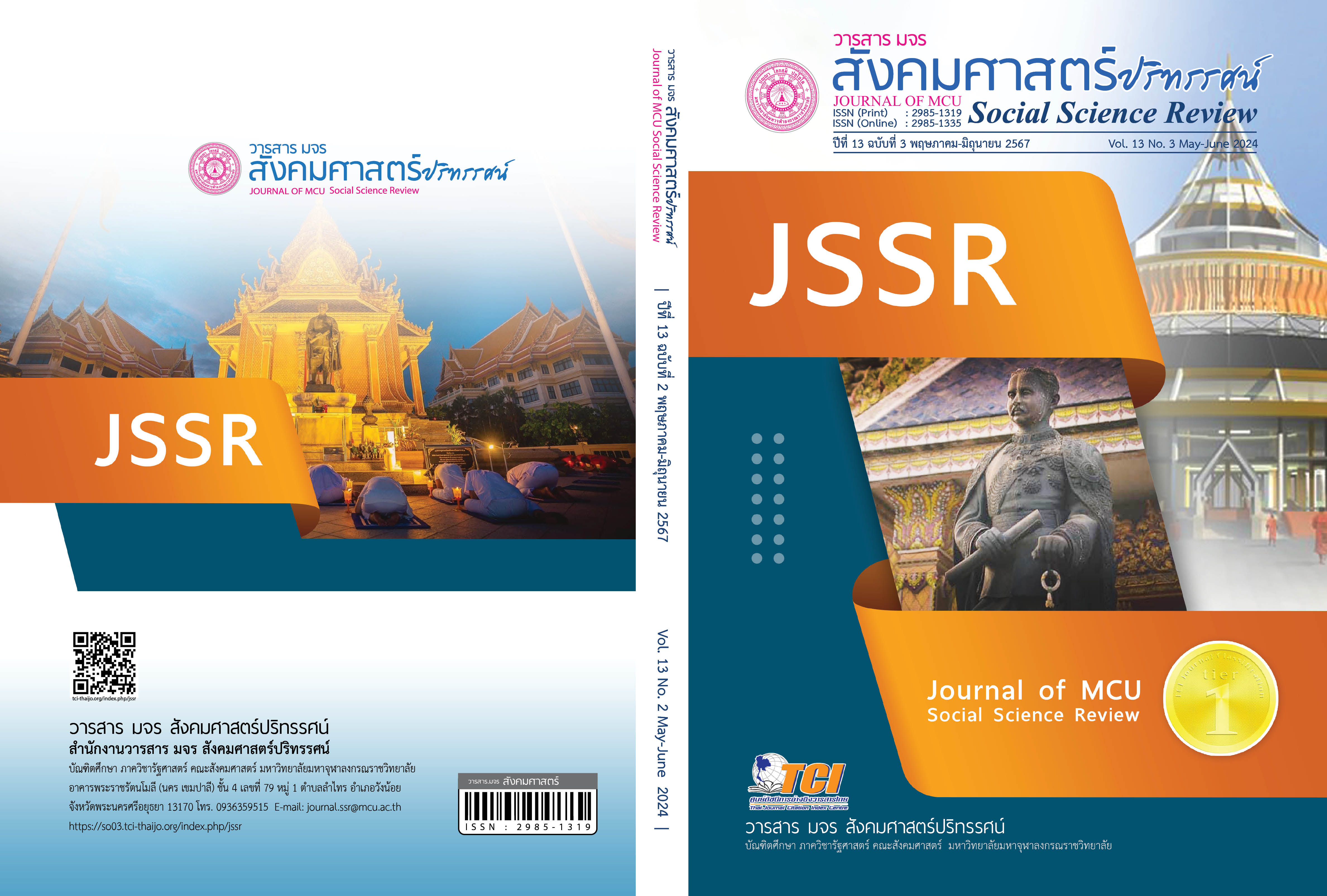ภาวะผู้นำตนเองของผู้บริหารสถานศึกษา สังกัดสำนักงานเขตพื้นที่การศึกษามัธยมศึกษากรุงเทพมหานคร
คำสำคัญ:
ภาวะผู้นำตนเอง, ผู้บริหารสถานศึกษา, สำนักงานเขตพื้นที่การศึกษามัธยมศึกษากรุงเทพมหานครบทคัดย่อ
บทความวิจัยนี้มีวัตถุประสงค์ 1. ศึกษาระดับทักษะภาวะผู้นำตนเองของผู้บริหารสถานศึกษา สังกัดสำนักงานเขตพื้นที่การศึกษามัธยมศึกษากรุงเทพมหานคร 2. เปรียบเทียบทักษะภาวะผู้นำตนเองของผู้บริหารสถานศึกษา สังกัดสำนักงานเขตพื้นที่การศึกษามัธยมศึกษากรุงเทพมหานคร เป็นการวิจัยเชิงสำรวจ ได้ศึกษาทฤษฎีภาวะผู้นำตนเอง กลุ่มตัวอย่างที่ใช้ในการวิจัยคือ ผู้บริหารสถานศึกษาที่ปฏิบัติงานในสถานศึกษาสังกัดสำนักงานเขตพื้นที่การศึกษามัธยมศึกษากรุงเทพมหานคร ปีการศึกษา 2565 จำนวน 169 คน เครื่องมือที่ใช้ในการวิจัย คือ แบบสอบถาม สถิติที่ใช้ในการวิจัย คือ ค่าเฉลี่ย ส่วนเบี่ยงเบนมาตรฐาน การทดสอบค่าที การวิเคราะห์ความแปรปรวนแบบทางเดียว และการเปรียบเทียบความแตกต่างของคะแนนเฉลี่ยเป็นรายคู่ด้วยวิธีการของเชฟเฟ่
ผลการวิจัยพบว่า ทักษะภาวะผู้นำตนเองของผู้บริหารสถานศึกษา สังกัดสำนักงานเขตพื้นที่การศึกษามัธยมศึกษากรุงเทพมหานคร โดยภาพรวมและรายด้านอยู่ในระดับมาก ด้านการพัฒนาตนเองด้วยการกำหนดพฤติกรรม อยู่ในระดับสุงที่สุด ผู้บริหารที่มีระดับการศึกษา ประสบการณ์การทำงาน และขนาดสถานศึกษาต่างกันมีภาวะผู้นำตนเองโดยภาพรวมแตกต่างกัน อย่างมีนัยสำคัญทางสถิติ จากผลการวิจัยแสดงให้เห็นว่าผู้บริหารสถานศึกษาที่มีปัจจัยแวดล้อมแตกต่างกัน ย่อมส่งผลต่อทักษะภาวะผู้นำตนเองแตกต่างกันด้วยเช่นกัน
เอกสารอ้างอิง
กระทรวงศึกษาธิการ. (2565). นโยบายรัฐมนตรีว่าการกระทรวงศึกษาธิการ. กรุงเทพฯ: สำนักปลัดกระทรวง กระทรวงศึกษาธิการ.
พระเมธีวชิโรดม (วุฒิชัย วชิรเมธี). (2550). คนสำราญ งานสำเร็จ. กรุงเทพฯ: อมรินทร์พริ้นติ้งแอนด์พับลิชชิ่ง.
Best, J. W. (1970). Research in Education (2nd ed.). New Jersey: United States Prentice-Hall.
Furtner, M. et al. (2011). Leading oneself: The relationship between self-leadership and personality. Social Behavior and Personality: An International Journal, 39(5), 677-686.
_____. (2012). Learn to influence yourself: Full range self-leadership training. Journal of the Indian Academy of Applied Psychology, 38(2),
-304.
_____. (2013). The role of trait and state self-leadership in innovation: A longitudinal study. Journal of Leadership & Organizational Studies, 20(1), 94-104.
Ghosh, S. (2015). Exploring the relationship between self-leadership and employee creativity: The mediating role of psychological empowerment. International Journal of Innovation and Economic Development, 1(3), 30-38.
Goldsby, M. G. et al. (2021). Self-Leadership: A Four Decade Review of the Literature and Trainings. Consulting Psychology Journal: Practiceand Research, 73(1), 32-57.
Hamdoun, A. (2021). Academic leadership commences by self-leadership. Retrieved March 20, 2023, from https://shorturl.asia/uaPUo
Hauschildt, K. & Konradt U. (2012). The effect of self-leadership on work role performance in teams. Leadership, 8(2), 145-168.
Hauschildt, K. et al. (2009). Self-leadership and team members' work role performance. Journal of Managerial Psychology, 24(4), 374-388.
Houghton, J. D. & Neck C. P. (2002). The revised self-leadership questionnaire: Testing a hierarchical factor structure for self-leadership. Journal of Managerial Psychology, 17(8), 672-691.
Manz, C. C. & Neck, C. P. (2004). Mastering self-leadership: Empowering yourself for personal excellence (2nd ed.). UK: Pearson Education.
Marques, J. (2010). The influence of organizational size on leadership and innovation. Journal of Applied Business Research (JABR), 26(3), 1-8.
Neck, C. P. & Houghton, J. D. (2006). Two decades of self-leadership theory and research: Past developments, present trends, and future possibilities. Journal of Managerial Psychology, 21(4), 270-295.
Neck, C. P. et al. (2019). Self-Leadership: The Definitive Guide to Personal Excellence (2nd ed.). Los Angeles: sage publications.
Ng, T. W. H. & Feldman, D. C. (2013). A comparison of self-ratings and rater ratings of the Big Five personality traits. Personnel Psychology, 66(1), 173-203.
Rovinelli, R. J. & Hambleton, R. K. (1976). On the use of content specialists in the assessment of criterion-referenced test item validity. Journal of Educational Measurement, 13(4), 307-317.
Scheffé, H. (1953). A method for judging all contrasts in the analysis of variance. Biometrika, 40(1/2), 87-104.
Stewart, G. L. et al. (2011). Self-leadership: A multilevel review. Journal of Management, 37(1), 185-222.
ดาวน์โหลด
เผยแพร่แล้ว
รูปแบบการอ้างอิง
ฉบับ
ประเภทบทความ
สัญญาอนุญาต
ลิขสิทธิ์ (c) 2024 วารสาร มจร สังคมศาสตร์ปริทรรศน์

อนุญาตภายใต้เงื่อนไข Creative Commons Attribution-NonCommercial-NoDerivatives 4.0 International License.
เพื่อให้เป็นไปตามกฎหมายลิขสิทธิ์ ผู้นิพนธ์ทุกท่านต้องลงลายมือชื่อในแบบฟอร์มใบมอบลิขสิทธิ์บทความให้แก่วารสารฯ พร้อมกับบทความต้นฉบับที่ได้แก้ไขครั้งสุดท้าย นอกจากนี้ ผู้นิพนธ์ทุกท่านต้องยืนยันว่าบทความต้นฉบับที่ส่งมาตีพิมพ์นั้น ได้ส่งมาตีพิมพ์เฉพาะในวารสาร มจร สังคมศาสตร์ปริทรรศน์ เพียงแห่งเดียวเท่านั้น หากมีการใช้ภาพหรือตารางหรือเนื้อหาอื่นๆ ของผู้นิพนธ์อื่นที่ปรากฏในสิ่งตีพิมพ์อื่นมาแล้ว ผู้นิพนธ์ต้องขออนุญาตเจ้าของลิขสิทธิ์ก่อน พร้อมทั้งแสดงหนังสือที่ได้รับการยินยอมต่อบรรณาธิการ ก่อนที่บทความจะได้รับการตีพิมพ์ หากไม่เป็นไปตามข้อกำหนดเบื้องต้น ทางวารสารจะถอดบทความของท่านออกโดยไม่มีข้อยกเว้นใดๆ ทั้งสิ้น





